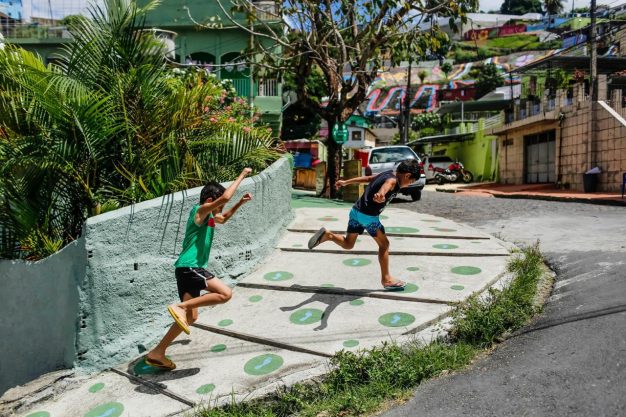
CitC Antwerp: Reflections on Placemaking and Co-creation
Irene Quintáns was the moderator of the Parallel Session on Placemaking and Co-creation during the Child in the City International seminar in Antwerp. In this article, she provides a summary of the presentations and ideas shared.
Irene Quintáns is the founder and director of OCARA Network and a member of Child in the City’s Scientific Program Committee (SPC).
Placemaking and Co-creation
Placemaking actions are currently enjoying international expansion with several scheduled events: (1) the third Latinamerican event (Lima, Peru -August 5th – 11th) (2) the European Placemaking Week (Valencia, Spain – June 12th-15th), Europe’s biggest conference and festival celebrating the impact of placemaking on the urban fabric; (3) Project for Public Spaces’ 3rd International Placemaking Week conference that will take place on October 1st-4th, 2019 in Tennessee, USA.
During the Children in the sustainable city seminar, there were two sessions on this issue. We got to know different approaches on the subject, and co-creation experiences as well: case studies, academic works and programmes linked to governments from Europe, Africa and Latin-America.
Alberto Nanclares presented the collective Basurama´s work in Africa (“Reusing local discarded materials for creating playscapes”) and Tullio Ponzi, Recife´s Executive Secretary of Urban Innovation shared Mais Vida nos Morros (Bringing life to vulnerable urban hills program).
Alberto’s proposal shows Playgrounds, built together with families using recycled materials for leisure space while adults engage in cultural activities. The debate as to where the boundary lies between colonialism and cooperation was rich and much needed. Recife’s public policy about citizenship and sustainable development transforms communities, engages residents, especially children, and improves their environmental consciousness. In countries with big social inequalities, we must care more than ever about the quality of interventions. “Too poor to build cheap”, commented Leo van Broeck, the Flemish Government Architect.
Naomé Carmeliet and Lieve Snoeckx from the Belgian Pedestrian Movement Voetgangersbeweging talked about the Octopus school campaigns; Leen Dom introduced two Belgian experiences targeting early childhood: Childcare 2030, in Mechelen, focused on education for sustainability and Green feet, in Antwerp, transforming play area and outdoor play.
Projects with schools need parents´ involvement and great documentation processes to share with them. Risk and safety discussions are highly needed in co-creation projects focusing on children.
Sabine Miedema, the winner of the Bernard van Leer Foundation Urban95 Challenge, shared her proposal about Mechelen and Wilselen (Belgium) front garden zones: “Children in the front zone’: Repeating front garden zones as crucial mediators between public space and young children’s (private) homes”; and Leila Natsheh`s presentation about Community Building Through Play strategies: Nourishing the bonds between & within families (Sweden).
Two great tips for all the placemakers: transform unexpected places into opportunities and do not forget to prioritize community building.
Sara Candiracci from ARUP showed some methods and tools for integrating children’s voices into urban design and planning processes. ARUP released in 2017 the report “Cities Alive. Designing for Urban Childhood”, compiling 40 global case studies, 14 recommended interventions and 15 actions for city leaders, developers, investors and built environment professionals.
Dr Michael Martin and Dr. Andrea Jelic from Aalborg University (Denmark) shared their systematic review of 159 academic papers about researches of co-creating places with and for children and suggested lessons for practice that emerged from their study. These reviewed papers were from all over the world except the Latin-American region, perhaps due to the regional difficulty to publish in English.
Finally, we can say that while it is extremely difficult to translate exactly the term “placemaking” into other languages, its meaning should always be the same: inspiring people to reinvent their spaces collectively and transform them in destination, gathering and socialization places.
Feature Image Photo Credit: Andréa Rêgo Barros – (Recife, Brazil)




